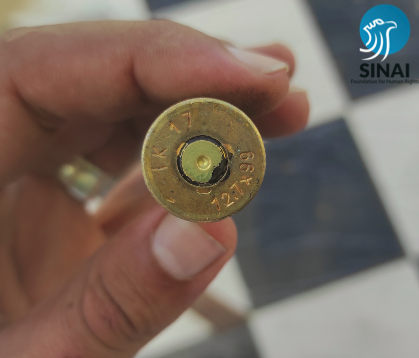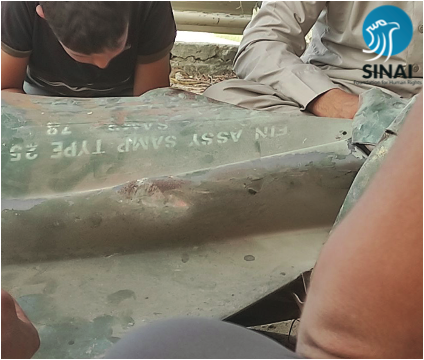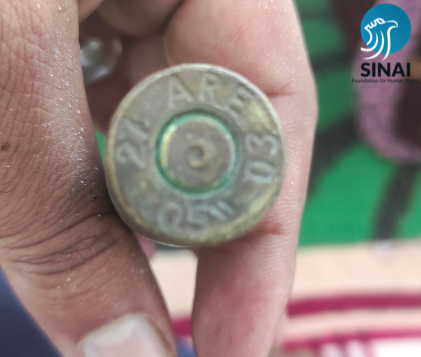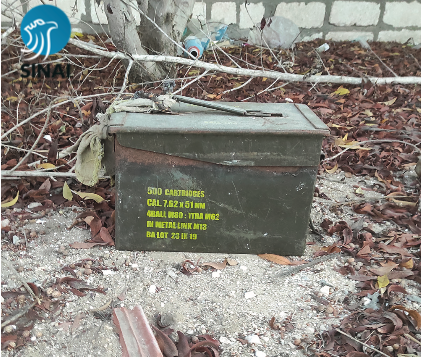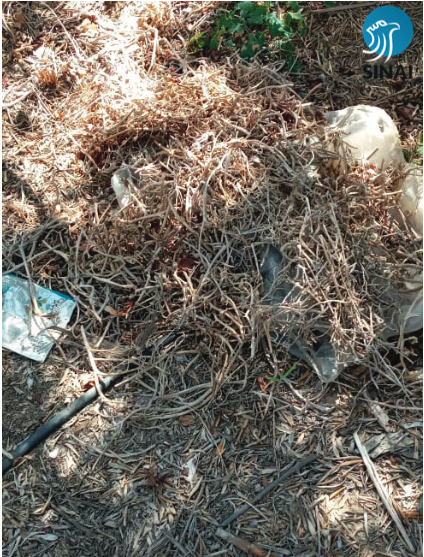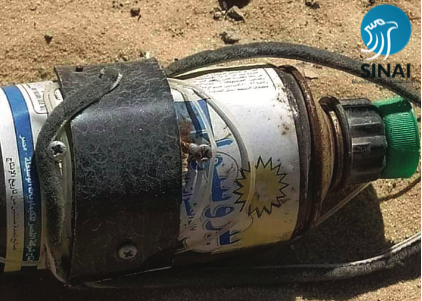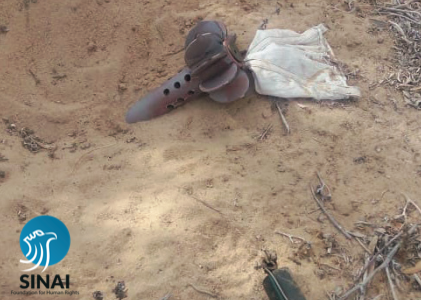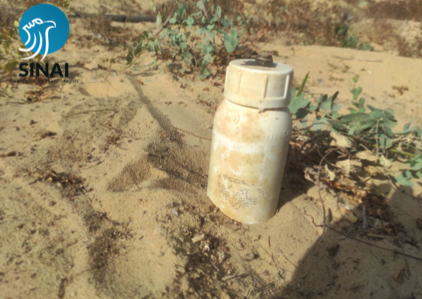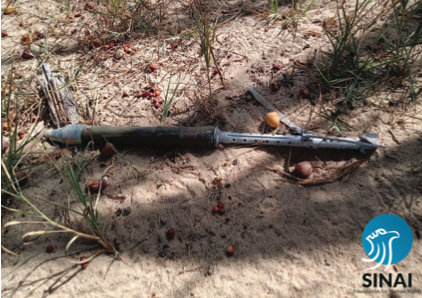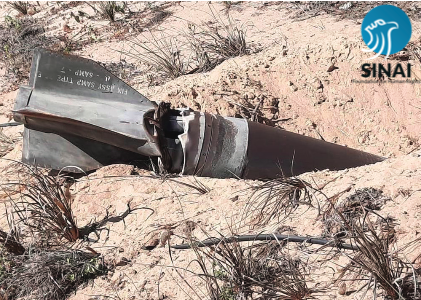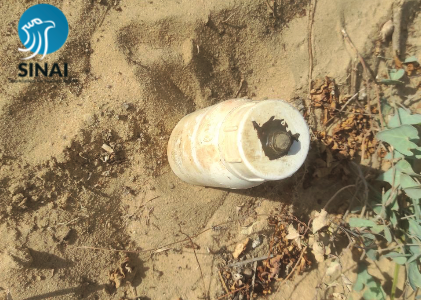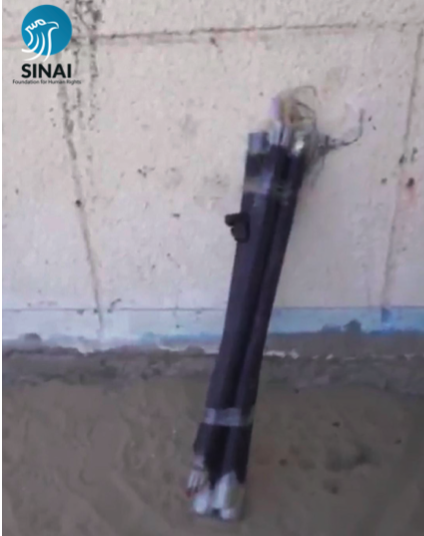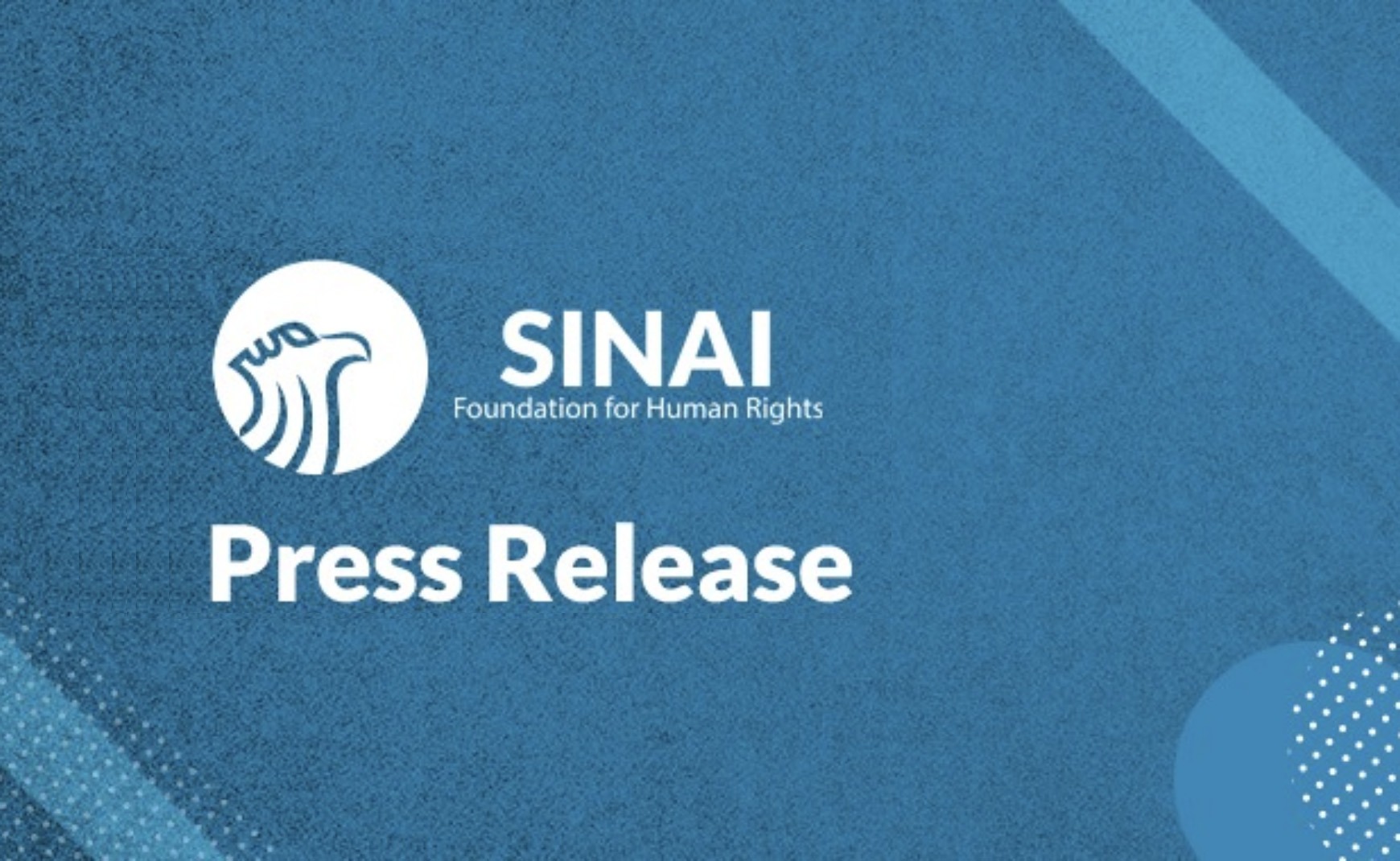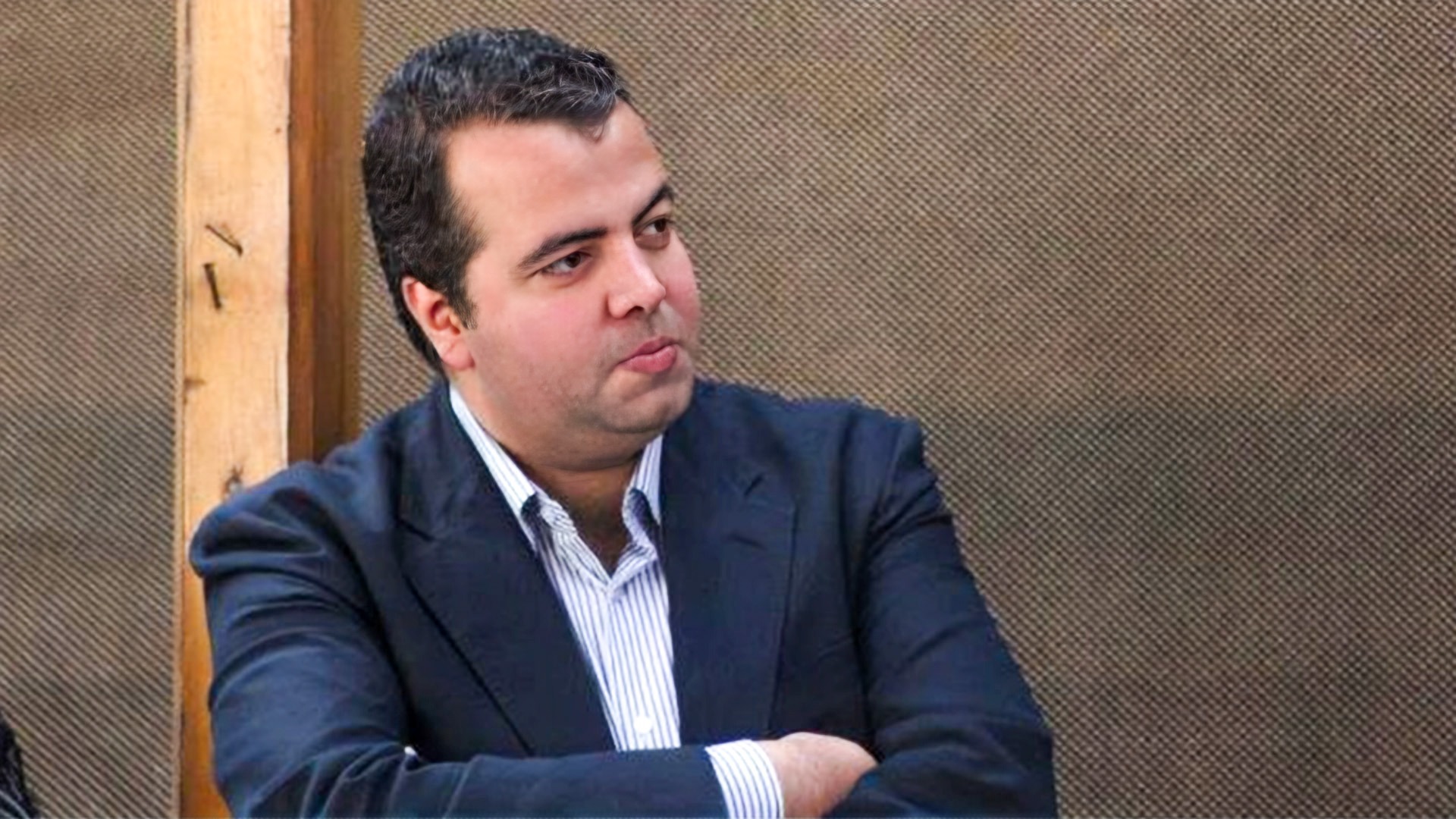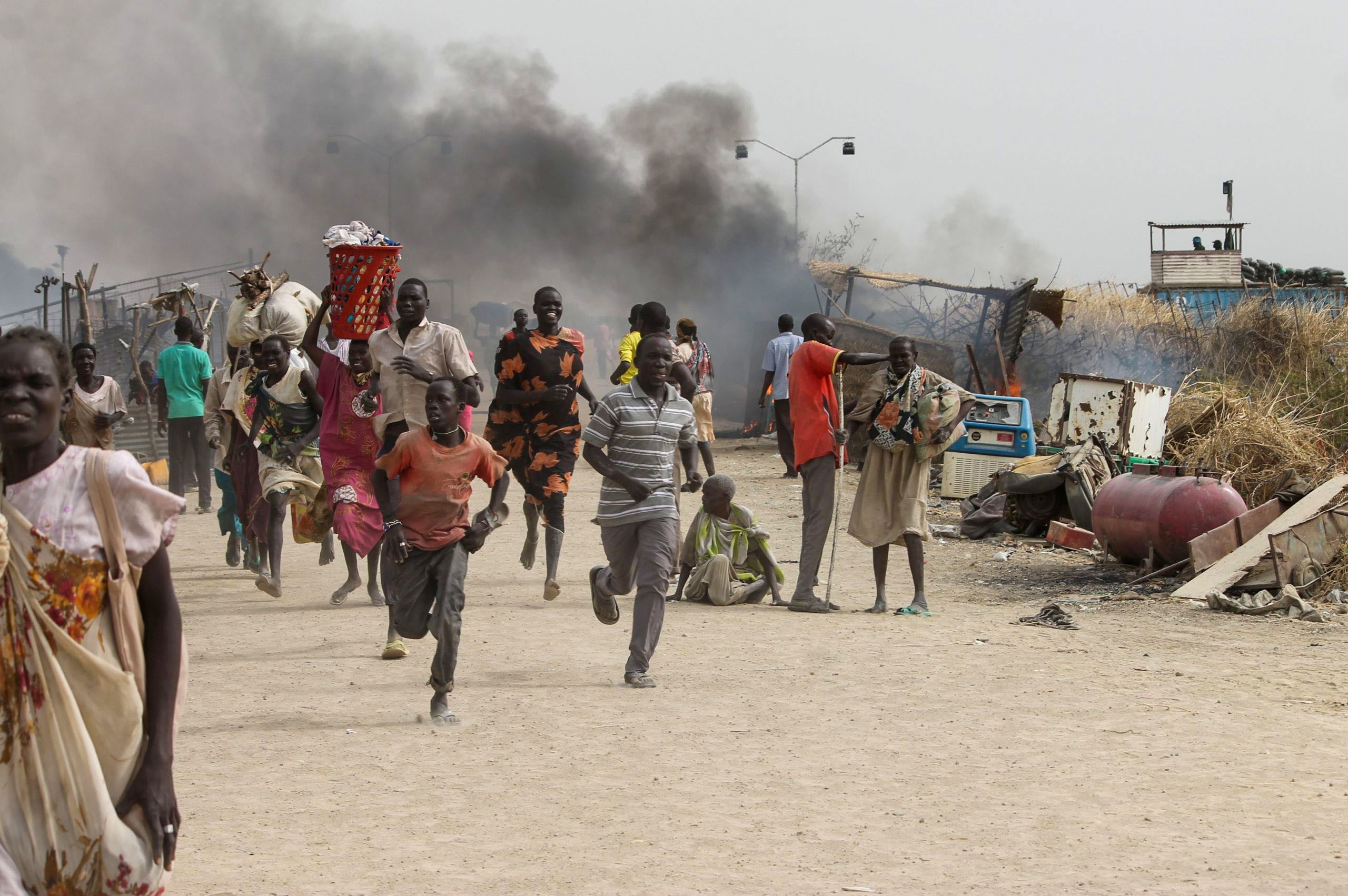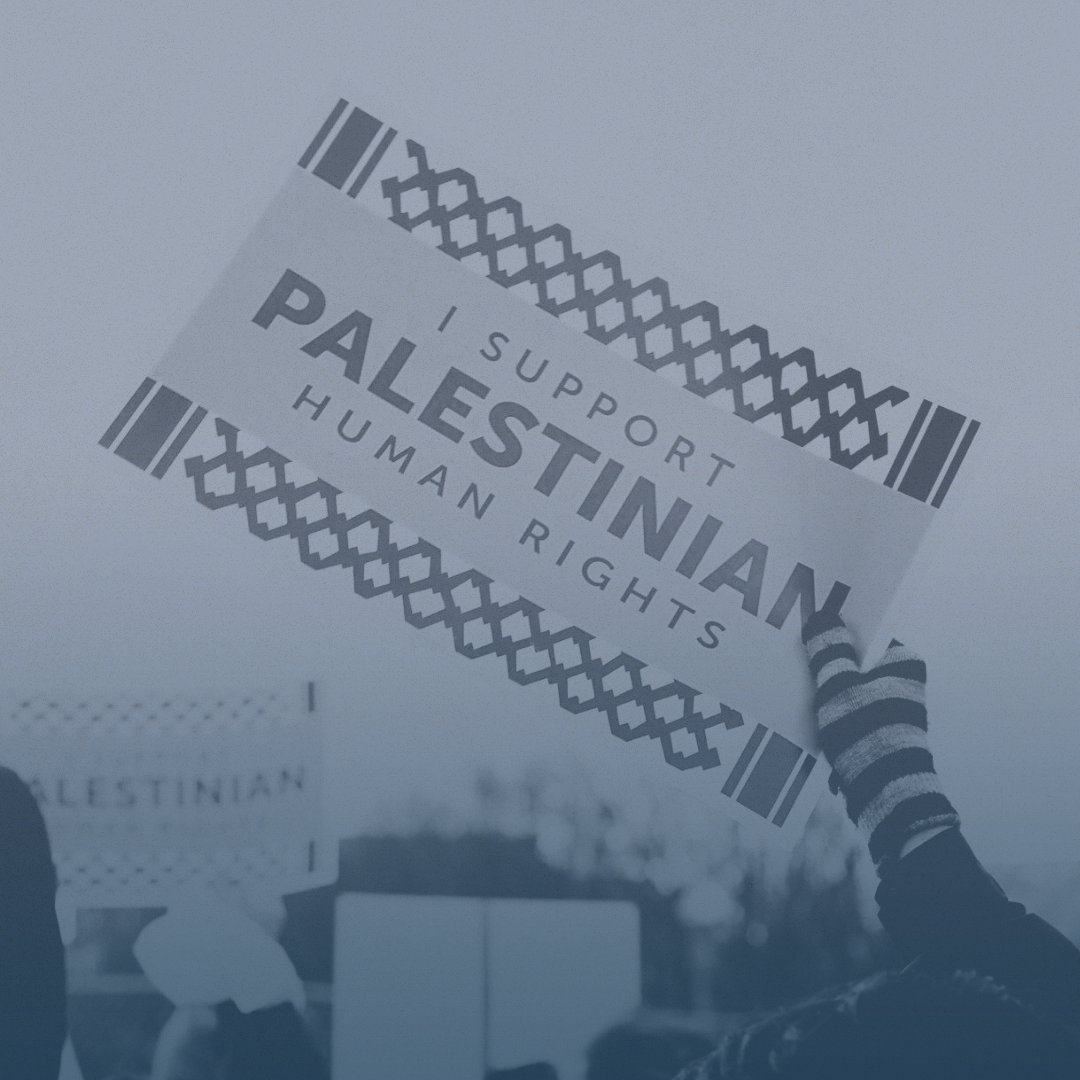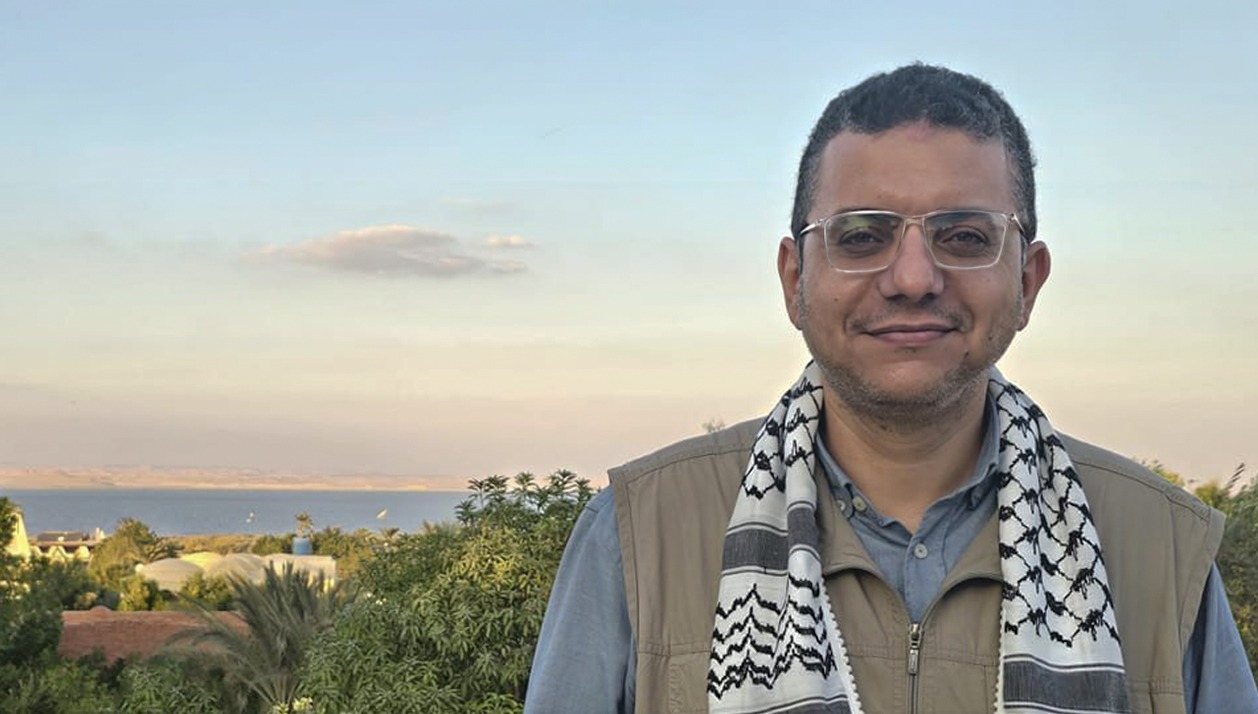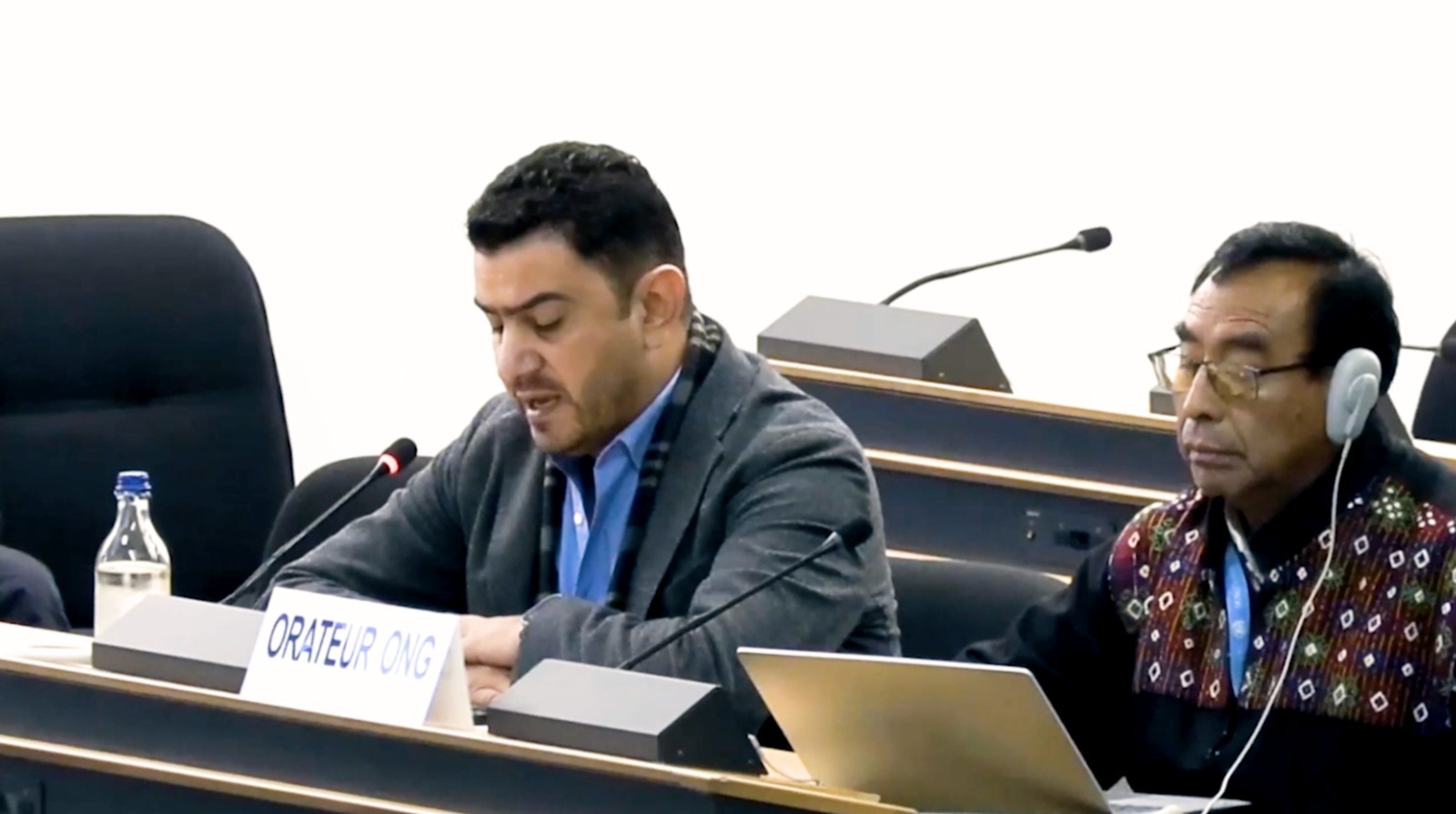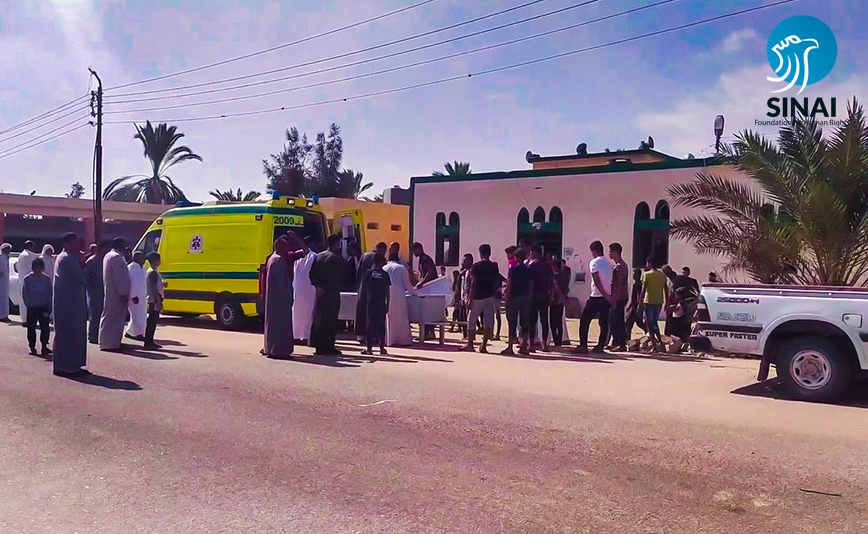
Monthly Human Rights report: October 2020
“the locals were pushed into a minefield, without any prior purification of the freed regions by the military”
Part of a local’s testimony, returning to the freed villages of “Bir al-Abd”.
Summary:
Despite the good news the Egyptian government gave to the people of the four villages of “Bir al-Abd”, freed from ISIS, allowing them to return to their villages: “Qatia”, “Iqtiya”, “al-Marih”, and al-Ganayen”, which were captured by ISIS on the 21st of the past July, the glee turned into funerals during a bloody month where a number of civilians died due to explosive and suspicious devices whose explosions lasted for the entire month, killing 16 people, 5 of which are children and 10 are women, and injuring 14 people, 11 of which are men and 3 are children.
Members of ISIS have also assassinated a man in the village of “Gilbana” in “Ismaila” governorate, which an eyewitness interviewed by the “Sinai Foundation for Human Rights” team considers as a dangerous sign that ISIS’s influence is expanding outside “North Sinai”.
The “North Sinai” citizens were also weighed down by violations by military forces and government bodies, the most prominent of which was the destruction and leveling of civilian properties in “Rafah” and ‘al-Sheikh Zwayed” outside the buffer zone on the borders with “Gaza Strip”. A civilian evicted from those areas has mentioned that hope to return to their homes is almost completely gone, because of the disappearance of any sign of civilian life in those villages.
In addition to the restriction imposed on civilians, as they have been restricted from moving between cities, and the prosecution of those evicted from hot zones, is addition to the prohibition and restrictions on livelihoods of many fishermen in “al-Bardawil” lake.
Our researchers’ reports have shown statements about using citizens by the military and forcing them to perform tasks without pay, and in areas that put their lives in danger. In addition to statements by civilians and eyewitnesses that record the repudiation of government and security forces from their responsibility to protect civilians. During that period, the “Sinai Foundation” team has met with 39 people, most of which are eyewitnesses and relatives of the victims.
This report includes an annex in which are exclusive photos recorded by the foundation team of explosive devices and camouflaged landmines and the remains of missiles and ammunition remaining in the freed villages for 20 days since the return of evicted civilians to their homes in the villages freed from ISIS’s grasp.
The details of the abuses:
Egyptian authorities and law enforcement forces abuses
The destruction of civilian objects in the surroundings of “Rafah” and the outskirts of “al-Sheikh Zwayed” outside the area of the buffer zone.
The International Humanitarian Law emphasizes on the prohibition of targeting, destroying, and leveling of civilian objects during national and international conflicts. Including houses and farms, as long as they are not used for military purposes. Many treaties and agreements stress on their protection, including what comes in Chapter 1 of articles 52/additional protocol (I) to the Geneva convention, 1977.
During October, groups that belong to the Egyptian military have continued bombing a number of uninhabited houses, including what happened on 02.10.2020, which destroyed uninhabited houses in the vicinity of the city of “Rafah” and the outskirts of “al-Sheikh Zwayed”
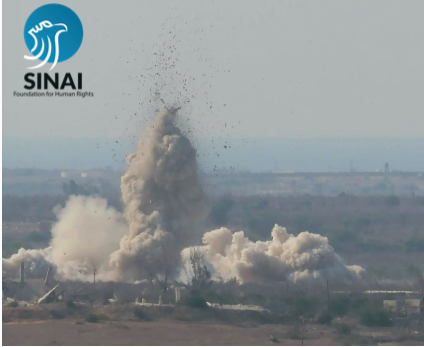
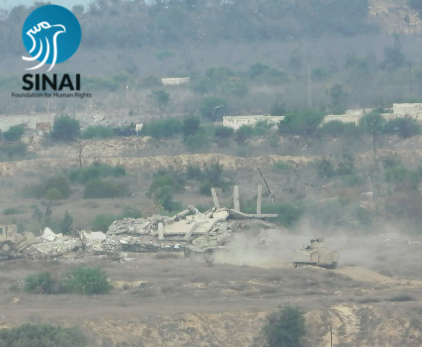
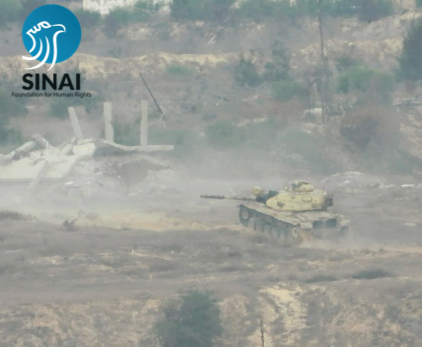
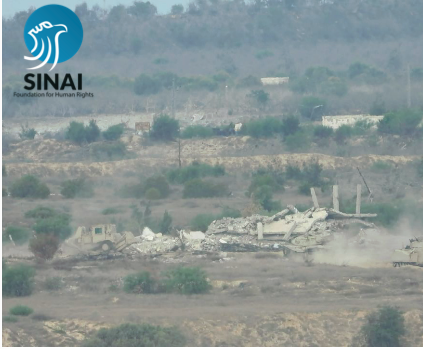
A 36-year-old eyewitness has told the “Sinai Foundation for Human Rights” that military armored vehicles set off from the ambushes in the vicinity of the uninhabited villages of “al-Wifaq” and “al-Matala”, outside the buffer zone that extends 5km from the borders of “Gaza Strip” to the west, and he added that the bombing of houses has been going on for over a month.
In the same context, two locals have told us that military patrols had bombed uninhabited houses in the vicinity of the villages of “al-Aqour”, “Abu-Tawila”, “al-Shahwain”, “al-Alawin”, southeast “al-Sheikh Zwayed”, and they’re all a long distance from the buffer zone.
An eyewitness added: “We escaped the villages in southern “al-Sheikh Zwayed” fearing for our and our children’s lives due to the clashes. We thought that they would be just days or months and we would be back. Before our eviction, my brother and I collaborated with the Egyptian army, monitoring the movement of “Takfiris” in our village. I could not imagine that one day we would see our military tearing down our houses for no reason! No one spoke with us or explained why our houses were destroyed even though our village is a long distance from the buffer zone and the borders. What is happening today is imposing a de facto with the aim of tearing down our roots from the area, which proves that the government has no intention of allowing the locals to go back to their villages in the future.”
On 19.10.2020, locals of areas surrounding “Rafah” reported that the bombing of houses and leveling of farms are still being carried out by the Egyptian military.
An eyewitness local to one of “al-Sheikh Zwayed” area has added to the “Sinai Foundation for Human Rights” researchers that they heard explosions and seen smoke plumes coming from “al-Alwain” in the village of “al-Khrafin” close to the eastern side of the village of “Abu-Tawila” in “al-Sheikh Zwayed”.
These bombing operations are performed by security campaigns carried out by military forces on those uninhabited areas, chosen to wipeout any sign of civilian properties that point out to the fact that these areas had been inhabited at a certain point. The houses are bombed and what’s left of the trees and farms in the area are leveled, according to eyewitness reports.
An “Abu-Tawila” local stated that armored forces passes through the village toward “al-Alawin”, accompanied by two armored vehicles carried on two trucks, then the sounds of explosions could be heard coming from there, and smoke plumes could be seen by the naked eye. Individuals in cooperation with the military have also told the locals about the military patrols bombing houses during the time they accompanied said forces.
The locals say that the bombardment operations have been going on despite the absence of any ISIS-affiliate Sinai Province members in the area, assuming that there is a desire to remove all houses in “Rafah”, regardless of the fact that the villages of “al-Kharafin”, “al-Wifaq” and “al-Mutala” are outside the vicinity of the buffer zone established by the government to put a stop to smuggling through tunnels, which leads the locals to lose hope in returning to their villages in the future.
An “al-Sheikh Zwayed” citizen complained that “The destruction happening in “Rafah” and the outskirts of “al-Sheikh Zwayed” constantly worries the locals. It gives no signs of life returning to how it used to be. If the government is talking about getting rid of a big sector of terrorists, then why are they destroying the areas with no ISIS elements? Life here has frozen over. No one can build anything for fear of an uncertain future, and the buying and selling of lands has stopped as well.”
The official data says that there are 11 subsidiary villages to the city of “Rafah”, and they are:
-
“Abu-Shnar”
-
“Al-Mutala”
-
“Al-Wifaq”
-
”Al-Husainat”
-
“Goz Abu-Raad”
-
“Al-Mahdiya”
-
“Al-Taira”
-
“Al-Khrafin”
-
“Shabana”
-
“Kilo 21”
-
“Al-Barath”
Excluding the village of “al-Barath”, all those villages have been evacuated, after the inhabitants were directly forced to leave because of the establishment of the “5 Kilo” buffer zone between the Egyptian borders and Gaza Strip, or indirectly due to the waves of forced eviction of the locals, fleeing from clashes between the military and ISIS militants, and fearing random bombardment and Egyptian military airstrikes, which do not differentiate between military targets and unarmed civilians.
According to the Central Agency for Public Mobilization and Statistics data, “Rafah” had a population of 75,537 in 2017, but the ongoing military operations since 2014 have caused the evacuation of the villages and areas. Only about 5,000 citizens are left in the village of “al-Barath”.
-
Pushing civilians into military businesses that make them target to either side of the conflict
A local eyewitness from “al-Sheikh Zwayed” has stated that military ambushes force citizens to perform services without legal justification and without pay.
He added that the forces trade the citizens fuel for their cars for transporting supplies and fuel to military ambushes, without their consent. Some locals sometimes comply because of the rarity of fuel and government restrictions on fuel supply that have been going on for more than two years, and other times some locals comply to avoid prosecution in case they refused to comply with the military forces’ demands.
A truck driver has confirmed in an interview with the Sinai Foundation that military ambushes on the coast of “al-Sheikh Zwayed” and “Rafah” use civilian drivers to transport supplies and fuel, in a way that puts their life in danger on unsafe and dangerous roads. The military forces have resorted to that after ISIS forces started targeting military forces transporting supplies to military checkpoints in the area. He added that there are farms where elements of ISIS are concentrated, and they stalk military forces and those they consider as associates, which is what happened with the citizen “Mahmoud Ismail Mahmoud Iskandar” who was murdered by ISIS on 26.10.2020 after they claimed that he’d been transportation supplies for the military. The foundation has recorded the details of the incident in this report.
An “al-Sheikh Zwayed” activist spoke with us, saying that local fishermen are lately being traded the permission to fish in areas where fishing has been prohibited by the authorities since 09.02.2018 at the launch of the comprehensive operation, for transporting supplies for military ambushes at the sea route.
The military ambushes adopt a mechanism to record the data of cooperating citizens whether they liked it or not, through recording those data or keeping the ID cards when citizens move from one place to another.
The activist stated that the security forces impose restrictions on the food supplies the citizens are allowed to bring in, to just the bare minimum of their needs, arguing the possibility of them reaching the hold of takfiris.
The phenomenon of moving supplies between ambushes doesn’t only happen on the coast of “al-Sheikh Zwayed”, but it also extends to all ambushes spread in North Sinai, where the civilian pickup truck drivers are forced to, whether they like it or not, transport supplies for the ambushes, in exchange for some fuel. These operations take place on Sunday and Wednesday of every week.
Despite the fact that none of those civilians participate in any military or hostile operations, ISIS still consider them involved in the conflict, alongside the military, or they attack them with the aim of deterrence and spreading terror, which makes the military largely responsible for putting civilians in danger by using them in their business. Chapter 2 of article 51 of the additional protocol (I) to the Geneva Conventions, 1977, blatantly states that the civilian population and individual civilians are under general protection, and they should not be the object of attack of acts or threats of violence, and that this protection is cancelled in case they participate in any direct act of hostility, and that all conflicting parties should adhere to those guidelines.
-
The hindering of the freedom of movement within “Bir al-Abd” without legal basis
Since 2013 and to this day, North Sinai has been languishing under the impact of military operations and the hardships they force onto the lives of the locals, including the hindrance of freedom of movement of civilians. The Universal Declaration of Human Rights has guaranteed in its 13th article that “Everyone has the right to freedom of movement and residence within the borders of each state.”
On 01.10.2020, the testimony of two of “al-Arish” locals revealed that the ambushes on the international highway towards “Bir al-Abd” prohibit their movement at night, in opposition to the law and with no security reason or ongoing law that allows them to do so.
The Egyptian authorities impose a curfew on “Rafah” and “al-Sheikh Zwayed” and some areas in central Sinai under resolution 367 issued on the 24th of October 2014, and it starts at 7 in the evening and ends at 6 in the morning, but in “al-Arish”, it starts at1 and ends at 5 in the morning. This resolution does not include the villages and areas of “Bir al-Abd”.
A 30-year-old local said that he left “al-Arish” at around 21:00, but he was surprised at the “Gaal” ambush area to the east of “Bir al-Abd” by the military checkpoint’s roadblock. The soldiers asked the drivers and travelers to wait till morning in their cars in the dark street, he added that some of the car passengers were women and children.
This testimony matched another, where an eyewitness stated that this procedure is carried out in the ambushes in the area surrounding “Bir al-Abd” on the international highway. Cars are not allowed to travel at night, with a tightening of this procedure on individuals coming from outside North Sinai or those travelling from “al-Arish”.
-
The failure to fulfill their responsibilities toward civilians returning to the freed villages in “Bir al-Abd” after their forced eviction from those villages
The United Nations has used the Guiding Principles on Internal Displacement inspired by the International Human Rights Law and the International Humanitarian Law, and assigned the responsibility to provide protection and humanitarian aid to the internally displaced on the national authorities in the first place, they also placed the responsibility of providing ways to enable the internally displaced to return safely to their homes and usual residencies on the authorities, as they were prohibited from discriminating against the internally displaced.
In this context, the first of the returning families to the villages of “Qatia”, “Iqtiya”, “al-Marih” and “al-Ganayen” arrived the morning of the 8th of October, after passing through vehicles belonging to the Egyptian law enforcement forces, that spread on the road leading to the villages and in their entryways.
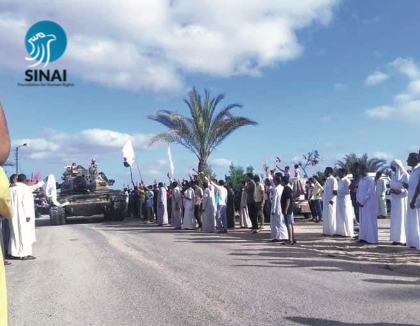
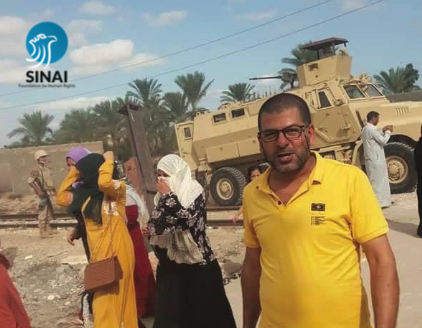
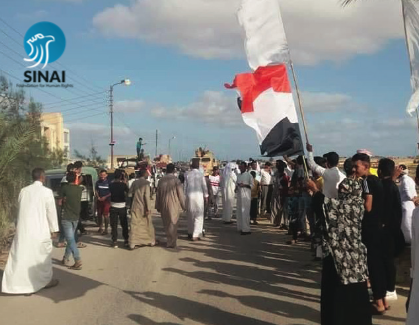
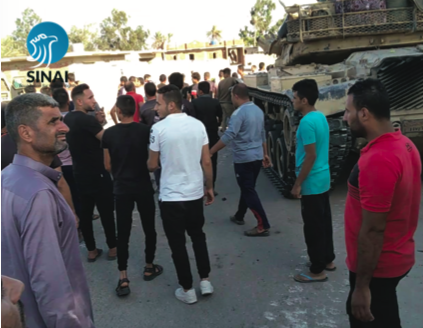
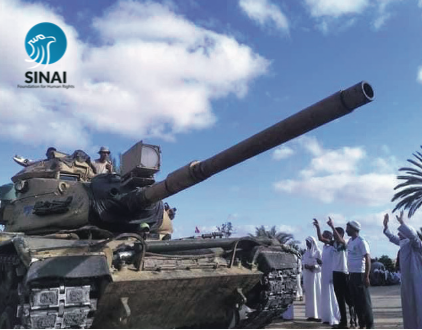
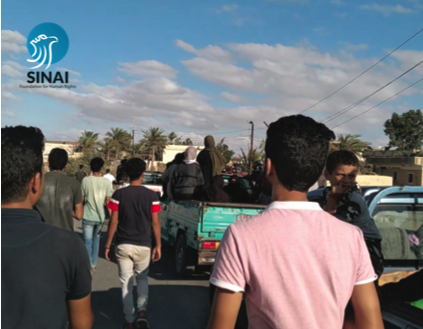
The “Sinai Foundation for Human Rights” team has met with a number of locals returning to their homes. A 45-year-old “Qatiya” local said: “Returning to the village was something like an impossible dream, after my neighbors and I saw what happened to those before us from the villages of “al-Sheikh Zwayed” and “Rafah”, but after I saw my house, I cried happy tears despite the damages done to it.”
An “Iqtiya” local said that the damages left behind by the clashes hit almost all houses and stores, and that renovating them is something the locals can’t do due to their poor financial status, and that some of those who lost their houses could stay living in “Ishash” (nests) due to the slow pace of the government compensation process, and the insufficiency of the offered money.
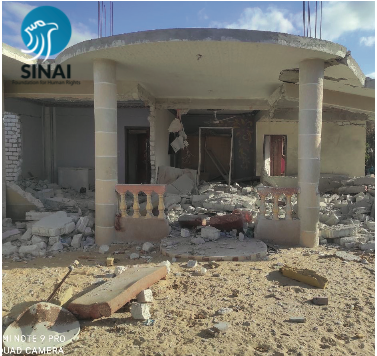
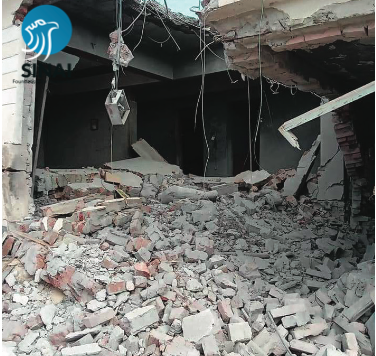
A member of the foundation team walked around with a farmer from the village of “al-Ganayen”, who estimated the area of the villages’ farms to be over 1000 acres. He pointed to the fact that most of the farms were damaged either because of being neglected for three months (the period of displacement), or because of bombings and leveling operations, and that the farmers can not compensate these damages without direct and immediate governmental intervention. Although the “Rafah” and “al-Sheikh Zwayed” experiences do not give hope, due to the Egyptian authorities actions in similar situations in Sinai, where the farmers were not compensated.
An “Iqtiya” youth revealed to the foundation that some of the locals are worried about being placed under security surveillance and restrictions in the future, which is a security measure the military puts the people of villages where armed conflicts with ISIS take place under, despite the fact that most of the village people were evicted during the first hours after ISIS entered the village of “Rabea”, and they supported the authorities in expelling ISIS militants from the village, and that their lives could be in danger if targeted by ISIS as a result of those procedures.
A citizen evicted from “al-Sheikh Zwayed” who lived in the outskirts of the village of “Rabea“, then moved to “Gilbana” after the clashes, has shown concern about returning to his old area of residence, as his neighbors warned him against going back, because those evicted from “al-Sheikh Zwayed” and “Rafah” and staying in the four villages are facing security restrictions and are being summoned to the military checkpoints with the aim of interrogating them and hindering their return to their rented houses after the authorities told the owners of the houses to file a report about anyone who’s not one of the village’s original locals.
The foundation team has noticed that the military mechanisms were available on the main roads of the villages with the aim of reassuring the locals that that the villages are safe and there are no ISIS militants inside. The team has also recorded the return of some families to the areas they were displaced toward at night because their villages didn’t have the basic life necessities like drinking water, electricity and communication. As well as noticing a wide local displeasure with their representatives at the House of Representatives, and the officials in local authorities who were not to be seen during the whole ordeal.
On 17.10.2020, a number of “Iqtiya, “Bir al-Abd” locals told the Sinai Foundation for Human Rights that the government’s failure to supply them with basic life necessities leads them to think about migrating from their villages after they returned to them on 08.10.2020.
A local stated that “Iqtiya” still suffers from lack of internet, despite the locals demanding the re-installment of communication networks from local authorities, so the citizens could call ambulances in cases of emergency, or report suspicious or strange bodies.
A parent complained to the Sinai Foundation for Human Rights team of the academic delay his children suffer from, which leads him to really consider moving from the village in order to ensure his children’s future, after schools were put on hold at the villages that fell under the ISIS-affiliate group, Sinai Province’s control. He added: “It doesn’t make sense for me to live in a place that only Allah knows how dangerous it could be. We were told that school was delayed for two weeks in the area, till the schools are secured and purified, in order to prevent any danger on our children. But are the streets safe after the schools were purified?”
The security authorities had decided to postpone the start of the school year for two more weeks in the villages to which the displaced have returned, with the aim of purifying the schools of explosive devices and suspicious bodies.
General “Mohamed Abdel-Fadil Shousha”, North Sinai governor, decided on 16.10.2020 to postpone attendance for 14 days in 17 schools in the villages of “Qatiya”, “Iqtiya”, “al-Narih” and “al-Ganayen”, subsidiary to “Bir al-Abd”, till they are secured and purified of exploding devices.
Two of the locals mentioned that the streets, houses and roads also suffer from explosions and the spread of suspicious bodies, and the explosions always result in civilian casualties. And the security authorities do not thoroughly secure the area. The Sinai Foundation has recorded a number of incidents of that type and released statements about them and published them on their official website.
The freed villages suffer a great deal because of the lack of basic life necessities, in addition to the severe dangers to the locals resulted from ISIS planting exploding devices and suspicious bodies that caused the fall of civilian victims. An eyewitness told the Sinai Foundation that the village of “Qatiya” suffers as much hardships as the other villages freed at the beginning of October.
Civilian lives are always in danger because of the repetitive explosions of suspicious bodies, leaving behind more victims, to the point that living in those villages has become like a nightmare, which is what the Sinai Foundation periodically reports through statements and publications. The eyewitness also added that the lack of services adds to the deteriorating security circumstances, as the communication and internet services keep getting cut off.
The security forces keep restricting the movement of the locals through intense and continuous security control, with no reflection on the security circumstances, as the schools were put on hold in 17 schools in the four villages freed from ISIS, because of the military forces’ failure to purify them and comb through the remaining areas for exploding devices.
An “Iqtiya” local spoke with us saying that the daily horror continues, considering that the military rounds always focus on the safety of their members from exploding devices, by using explosive-detecting vehicles, as opposed to a total negligence of civilian houses and farms, many of which are still abandoned, in fear of exploding devices that might be planted there.
Procrastinating and the restrictions on the incomes of “al-Bardawil” lake fishermen
The Universal Declaration of Human Rights states in article 23 that: “Everyone has the right to work, to free choice of employment, to just and favorable conditions of work and to protection against unemployment. ", which makes the next action a human rights violation.
The security forces stopped the fishermen from making use of the current fishing season in “al-Bardawil” lake in “Bir al-Abd” and only allowed fishing in November and December.
The Ministry of Defense website has published that the prohibition would stop at the first of November 2020, then the prohibition resolution was reactivated on 31.12.2020. The normal fishing season starts the first of May of every year, and ends by the end of December.
An “al-Sadat”, “Bir al-Abd” citizen complained that the resolution came too late and in a limited time as the area’s locals basically depend on fishing, and that the time frame the security forces gave the civilians would not be enough to support the citizens for the entire duration of the prohibition. He added that the resolution prevents mare than 4000 fisherman whose lives are already hard enough, from making a living. He said that the restriction is only imposed on poor people, as some are allowed to fish in “al-Bardawil” at all times, even during the ban. Fishing trips from Cairo are allowed to catch the best types of fish and transport them to their homes in Cairo, with no oversight or even fees to be paid, as well as the boat-owning fisherman close to the security forces.
ISIS-affiliate group, Sinai Province abuses
Random indiscriminate weapons that leave behind dead and injured in “Bir al-Abd” villages
Since the return of the people of “Qatiya”, “Iqtiya” , “al-Marih”, “al-Ganayen”, and “Rabea” to the areas from which they were forcibly displaced in the wake of ISIS’s control over them, these villages have witnessed explosion of explosive devices and foreign objects planted by ISIS, or left behind after ISIS’s withdrawal from these villages, and the Sinai Foundation for Human Rights has documented 8 of these incidents.
These events clearly show how the conflicting parties in general, and ISIS militias in particular, use random, indiscriminate weapons that harm both civilians and combatants, which is a dangerous behavior that has led to the killing and injury of many civilian victims, which is against international humanitarian law that makes distinguishing between civilians and combatants a necessity regardless of the kind of conflict or its parties, and confirmed in article 48 of the additional protocol (1) to the Geneva Conventions, 1977.
It is the responsibility of Egyptian authorities in general, and Egyptian armed forces in particular, to ensure the security of the area in a manner that completely guarantees the protection of people’s lives, and must ensure that this kind of incident is not to be repeated, as those events show that it failed to perform its duties of protecting civilians and ensuring their safe return to their areas. It should be noted that the International Humanitarian Law obligates all conflicting parties on the field to provide civilian protection on their respective controlled areas.
On 08.10.2020, the explosion of a suspicious object planted inside a closet in a “Qatiya” village home led to the death of 2 women and the injury of a third man.
A medical source mentioned to the Sinai Foundation for Human Rights representatives that “Bir al-Abd” General Hospital received 2 bodies, and an injured person on the first day of the return of the evicted on the 8th of October 2020, the victims were;
Dead;
1-Mona Hameed Abdul-razak, 36
Mona Amer Hussien, 39
Injured;
Suliman Kamal Mohamed Ahmad
The medical source also revealed that this was not the only incident that day, the hospital received 2 other bodies of a woman and her daughter from “al-Ganayen” village. An unknown object had exploded somewhere near their home. According to hospital information, the dead were;
Aieda ‘Warda’ Hassan Saleem, 38
Heba Mahmoud Saleem, 2.5
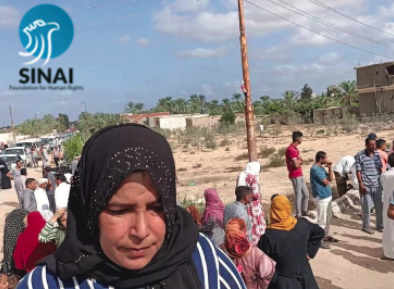
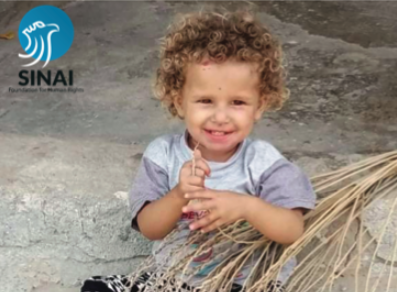
An eyewitness from the residents of” al-Ganayen” said; ‘We heard an explosion, we did not know its source and when we went out to see what had happened, we saw torn body parts on the side of the road. We were not able to identify the victims because of how badly the bodies were mutilated until a passersby told us he was in the street when the explosion took place, and that he saw the family of our neighbor, Mahmoud Seleem, then one of the residents transported the victims to the hospital with his own car, because of the unavailability of ambulances.
We spoke with a lady who was Warda’s neighbor who had met with her prior to the explosion, she told us while extremely distressed; ‘Poor Warda, she was so happy because of our return to “al-Ganayen”, she greeted me and we hugged, I didn’t know it was the last hug. She told me ‘I will go to my brother’s house to ask him to turn on the water pump so I can fill the water tank in my house’ She was just coming back before the rest of her family to prepare the house for their return, but death was faster. She stepped on a landmine that was planted to target a tank, her and her daughter Heba were torn to pieces in seconds.’
The eyewitness pointed the point of explosion out to us, we noticed a concentration of tanks in the area on the sides of the road. The eyewitness told us the tanks were there before the explosion and the landmine was planted to target one of them.
On 12.10.2020, an explosion of a suspicious body in a civilian vehicle led to the death of 2 women, 3 children, and the injury of a man from the displaced people returning to their homes in the village of “Iqtiya”, “Bir al-Abd”, according to an eyewitness and a medical source that Sinai Foundation for Human Rights researchers met with.
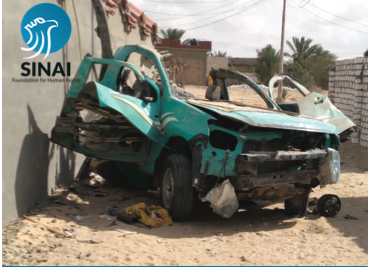
According to data acquired by the foundation, the explosion caught an entire family, and they are:
The dead;
1-Wafaa Seleem Mohamed, 28, her daughters Dema Nour Eid, 9 months and Sumaia Nour Eid, 3
Lamiaa Mohamed Harb, 17
Fatima Nasr Abdullatif, who was pregnant at the time of the explosion
Injured;
Anwar Eid Harb, 26, husband to Fatima
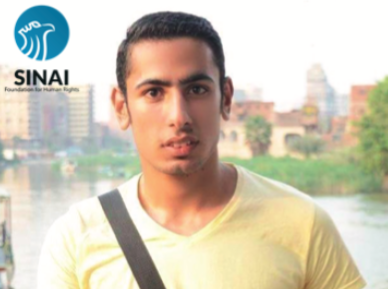
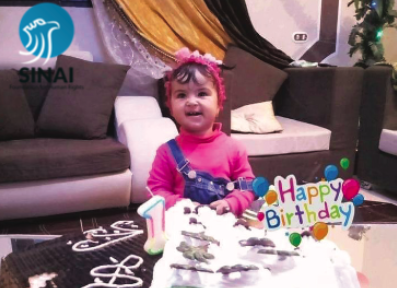
On 14.10.2020, an eyewitness told the Sinai Foundation team that a man was killed and 2 others were injured after a suspicious object exploded in one of the farms in “Al-Marih”, “Bir al-Abd” and they are;
The dead;
Kamal Mohamed Salama
The injured;
Suliman Ghanem Salim, 58
Sherif Suliman Ghanem Salim, 28
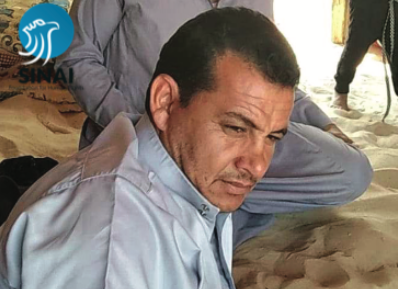
The eyewitness added that the injured are suffering from a spread of shrapnel across different parts of their bodies, in addition to bruising in other parts due to the impact of the explosion.
One of the local residents held the army responsible for what is happening in another interview with the foundation’s team, saying that ‘It pushed the people into a minefield, without clearing out the liberated areas beforehand’ and adding in his statement to our team that government agencies ‘told us that return will be delayed until villages are cleared, but they were not cleared to safety for the residents, only God knows our fate with the explosive packages.’
An eyewitness also mentioned to the Sinai Foundation that on 20.10.2020 an 8-year-old girl named ‘Hagar Mohamed Othman’ was injured due to the explosion of a suspicious object, leaving her with injuries in different parts of her body. He explained that the child was playing near her home in the “Sabeel” neighborhood in “Ravea”, “Bir al-Abd”. She was transported to the “Bir al-Abd” Hospital to receive first aid.
The eyewitness mentioned that the child was transported in a local car belonging to one of the residents, due to the absence of ambulances from the area, as well as the poor networks, making it hard to call the hospital and ask for an ambulance to transport the injured child to the hospital.
He also mentioned that the child was taken from the “Bir al-Abd” hospital to the “Zagazig” University Hospital in “al-Sharqiya” Governorate, due to the lack of medical staff and infrastructure in the “Bir al-Abd” hospital, especially in the emergency sectors.
According to the Sinai Foundation observations, the healthcare situation in North Sinai is extremely bad and it puts the safety of civilians in danger. The facilities and medical services need immediate rehabilitation that allows them to deal with severe cases resulting from repetitive explosions of unknown objects left behind by ISIS attacks.
The previous statement is similar to another statement from one of the locals given in an interview with our foundation’s researchers, that the lack of commitment to clearing the freed areas from suspicious objects reinforces the fear and anxiety of the local residents. Like with the latest incident that led to the injury of a child.
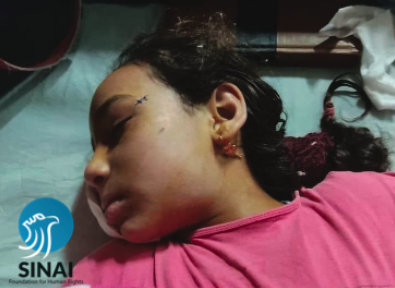
On 22.10.2020 Sinai Foundation for Human Rights researchers documented the death of a of 14 years old preparatory school student, named “Eid Mohamed Eid al-Qalgy”, due to the explosion of an explosive package in “Iqtiya”, “Bir al-Abd”.
As for the details of the incident, an explosion took place around 15:30 in a palm tree farm, one of Eid’s relatives told the foundation’s team over phone; “once I heard an explosion I went out to see what happened, I found some people going towards the source of explosion, when we got there we found a hole and by it Eid’s body parts, it was a gruesome scene, we found the bigger part of the body, his torso and head, about 20 meters from the place of explosion, we found other parts about 50 meters away, later some people told me they found other parts more than 100 meters away, this horrible scene does not leave my mind, I haven’t been able to sleep normally since Eid’s death, nightmares haunt me.”
An eyewitness revealed to us that inside the hole where the explosion took place, he found remnants of the explosive package, which was a plastic barrel, and that some of those who witnessed the incident tried to call an ambulance but it did not come. So they gathered the remaining body parts and took them to the mosque to pray for and bury the victim. After prayer, a call to the military was made, it confirmed that the body must be taken to hospital to issue a death certificate, so the victim’s family complied with the military’s instructions, and on the following day at 10 in the morning, an ambulance came from hospital with the body, and the prayer for Eid was performed a second time after dhuhr prayer, then he was laid in his final resting place in the village cemetery.
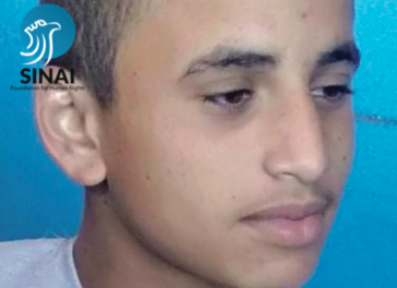
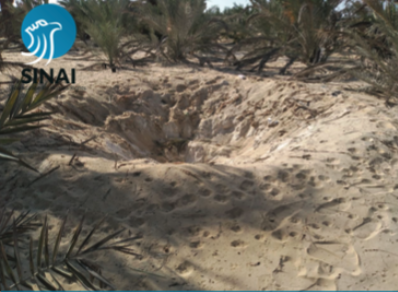
On 24.10.2020 Sinai Foundation for Human Rights recorded the death of 4 women, and the injury of 4 other people from the same family in 2 consecutive explosions that had been planted near their home in “Iqtiya”, “Bir al-Abd”.
An eyewitness told us the details of the incident: An explosive package which was prepared to target army mechanisms exploded and took the lives of 3 women, while 4 others were injured by shrapnel in different parts of their bodies. The Sinai Foundation for Human Rights has released a report on the incident. The victims are;
Dead;
Sharifa Abdulmalik Ibrahim Salim, 40
Isbiha Abdulmalik Ibrahim Salim, 39
Fatima Abdulmalik Ibrahim Salim, 65
Fatima Salman Salim, 20
Madeha Saleh Mohamed Sulaiman , 45
Injured;
Reda Hassan Yousef, 45
Shady Salem Abdulmalik, 35
Riyad Ibrahim Salim, 15
Ibrahim Mohamed Ibrahim, 16
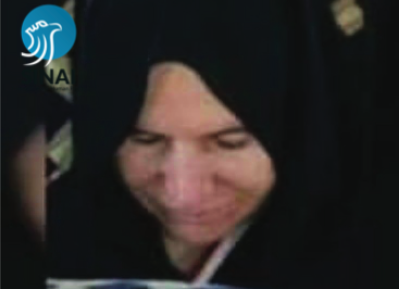
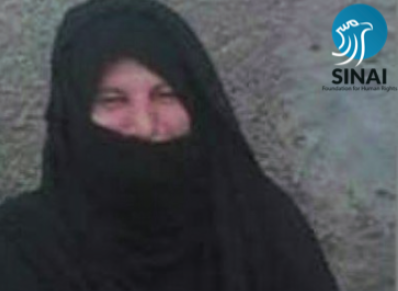
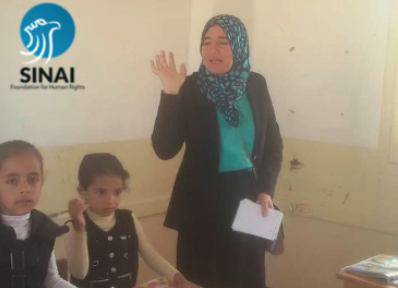
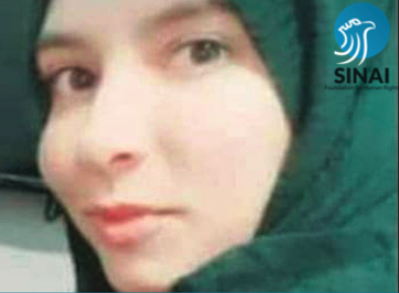
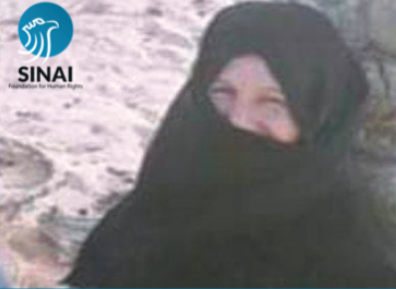
A local resident mentioned that the village ‘turned into a large funeral as a result of the incident, and what had taken place before it from incidents and explosions, until everyone became in constant terror that another explosion would take place, which the Egyptian armed forces have neglected in sweeping.’ He added that the sweeps are not run seriously enough, despite the army’s request that residents report suspicious objects, the residents’ lack of experience prevents them from recognizing possible explosive items. Also explosive packages are invisible above ground, and explode once tread upon, which leads to the residents falling victim to these traps left by ISIS.
On 31.10.2020 Sinai Foundation for Human Rights researches recorded the injury of 5 civilians in “Iqtiya”, “Bir al-Abd” after the explosion of a suspicious object near their home.
An eyewitness mentioned that the shrapnel from the explosion near the house owned by “Fayez Abu-Nagdy” left the victims with medium to light injuries due to its impact and the shrapnel dispersal that came with it.
The injured;
Yamani Ali Yamani, 36
Mohqned Mahmoud Seleem, 33
Seleem Ahmad Seleem, 21
Said Ahmad Seleem, 30
Mohamed Harb Hareeb, 26
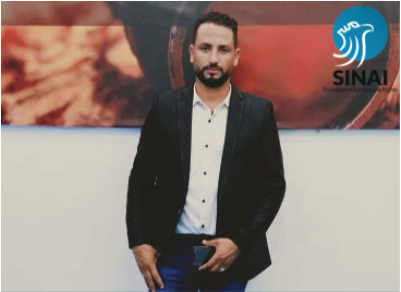
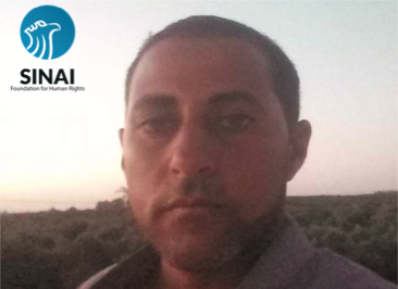
Extrajudicial killings in “al-Sheikh Zwayed” and “Ismailia”
The Geneva Conventions concerned with armed conflicts have agreed in common article 3 to the prohibition of “violence to life and person, in particular murder of all kinds, mutilation, cruel treatment and torture” of civilians. All four conventions consider “premeditated murder” of protected persons as a serious violation. All human rights agreements have agreed on the prohibition of the “arbitrary deprivation of life”. The ISIS-affiliate Sinai Province group is considered as a conflicting party in Sinai, and the principles and rules approved by the international treaties concerned with international and non-international conflicts apply to them.
On 26.10.2020, ISIS members kidnapped and murdered a fisherman from the village of “al-Sakadra” in “al-Sheikh Zwayed” called “Mahmoud Ismail Iskandar”, 67 years old.
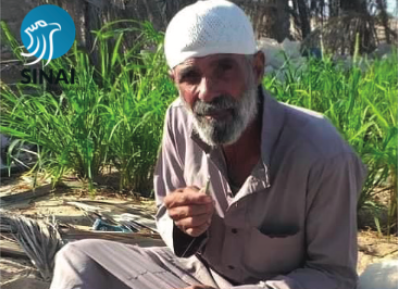
We met with an “al-Sheikh Zwayed” local, where the fishermen moved after he was evicted from his village, and he said that the body was not delivered to the victim’s family and they could not find him, and that his family knew he’d been murdered after the takfiris issued a statement on their “al-Nabaa” webpage, saying that the fishermen was executed by gunshot for allegedly working with the military.
He added that the fishermen was an “al-Sakadara” local, in “el-Sheikh Zwayed”, and he’d recently settled in the city after being evicted from the village by the military forces alongside a large number of the village inhabitants last April, and only a small number of the inhabitants remains in the village. He revealed that ISIS claimed that “Mahmoud” is one of those cooperating with the security forces, transporting supplies to the military ambushes. It should be noted that the victim’s family have not found his body till the time this report was published.
ISIS practices extrajudicial killings against civilians under false pretenses like transporting supplies or fuel or drinking water for the security forces. They have also previously targeted construction workers who worked on building a wall surrounding “al-Arish Airport”, and truck drivers who worked at a concrete factory belonging to the Egyptian military.
An “al-Sheikh Zwayed” activist has stated that the small number of locals remaining in the village of “al-Sakadra” are citizens who have no way of moving to other safe areas, and most of them are farmers and fishermen who are living in terrible circumstances, as their only food source is what the security ambushes provide them with in low-priced bean cans and tuna and cheese.
On 31.10.2020, ISIS militants assassinated the citizen “Saqr al-Said al-Masoudy” before his house in the village of “Gilbana”, western Sinai, claiming that he cooperated with the security forces.
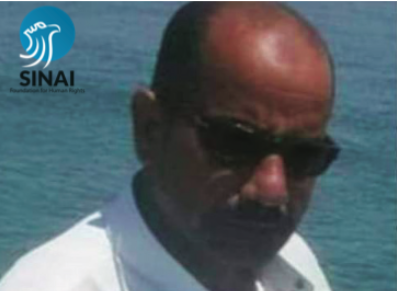
In an interview the team conducted with a “Gilbana” local, he stated that two armed militants snuck into some greenery near “Saqr’s” house and waited till he got back home, then the witness heard heavy gunfire that prevented him from leaving his house. He tried to see what was happening through his window, and saw a motorbike leaving quickly. When he was sure the gunfire had stopped, he went outside with some neighbors to try and save the victim, but they found him in a pool of his own blood, dead.
This incident is considered to be a dangerous sign that ISIS’s activity is spreading outside their usual activity zone, as the village lies in the far west of the Sinai Peninsula.
Recommendations:
-
-
To the Egyptian authorities
-
-
Immediate campaigns should be launched to purify the freed areas from landmines and explosive devices and bodies, in order to preserve the lives of civilians, which lies at the core of the country’s responsibility for its citizens and guarantying their safety.
-
Launch transparent and fair investigations into the incidents resulting from the explosion of exploding devices and strange bodies, where the victims were civilians, and holding those responsible accountable for their negligence and failure to uphold their duties.
-
Shifting away from pushing civilians into circumstances that put their lives in danger, including forced labor and transporting supplies and fuel, and from using them in a way that points to their alignment with a certain party in the conflict.
-
Untying the discriminatory and illegal chains on commercial activities and fishing and transportation in Sinai and offering immediate and fair compensations to the civilians harmed by the obstacles the authorities have unjustly placed.
-
Complying with principles of the International Humanitarian Law by the military and security forces is an important basis that guaranties professionalism in performing their duties. Officers and military personnel should be taught those rules and trained to abide by them through curricula in the military academy and other training courses.
-
Inviting and accepting visitation requests from UN special procedures mandates to Sinai, and allowing them unhindered access, and guarantying the safety of those who cooperate with them from punishment.
-
Modifying laws and systems that grant unlimited authority to the security and military forces, including the state of emergency and the counterterrorism law, and implementing mechanisms that guarantee judicial and legal supervision on law-enforcement authorities.
-
-
To all conflicting parties, including Sinai Province militants:
-
-
Committing to not use weapons unregulated by rules of armed conflict, include random indiscriminate targeting.
-
Taking all possible precautions to protect civilians, according to the International Humanitarian Law, during any military land or air raids.
-
All possible precautions are to be taken in areas where a nongovernmental conflict party is the governing power according to the reality of the situation to protect all civilians, without discrimination, and to guarantee meeting the essential needs of civilians.
Special appendix
-No safe return in the shadow of these threats-
The attack by ISIS on the military camp in “Rabea” and the clashes between the two sides that followed, have left behind an unknown number of explosive devices and camouflaged landmines and residues of strange bodies left behind by explosives or missiles used by the two parties.
After the locals’ return to the freed villages at the beginning of last October, the Sinai Foundation has recorded eight incidents resulting from the explosion of explosive devices and strange bodies, which leads to an obvious failure by the Egyptian armed forces and the relevant government authorities to carry out their role in guarantying the safe return of evicted citizens through purifying the villages and their surroundings from deadly residues, despite the locals assurance that they had been allowed to return to their homes after the authorities confirmed that their return is possible and imposes no danger to the citizens’ lives. The Sinai Foundation team has visited the villages and documented the existence of explosive devices and bodies through a collection of photographs. Next is some of what has been recorded:
